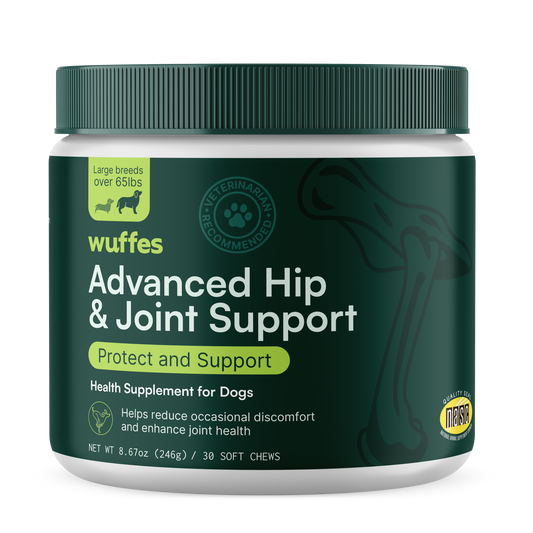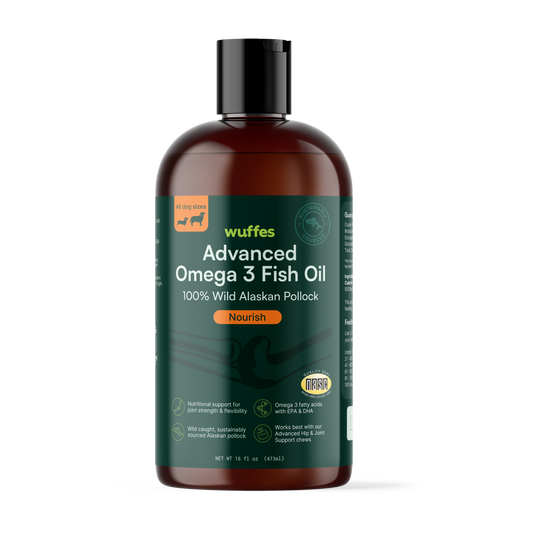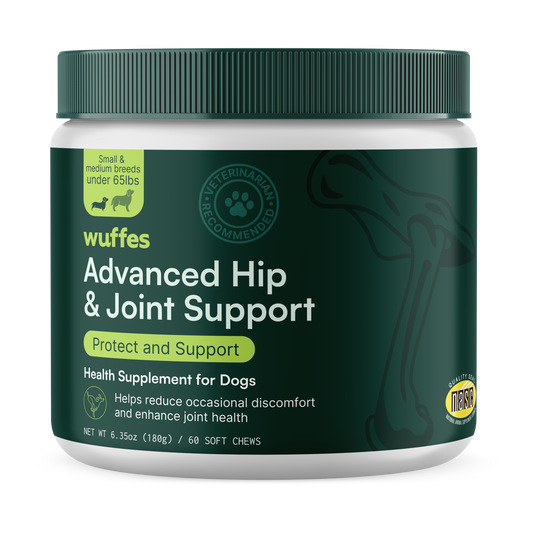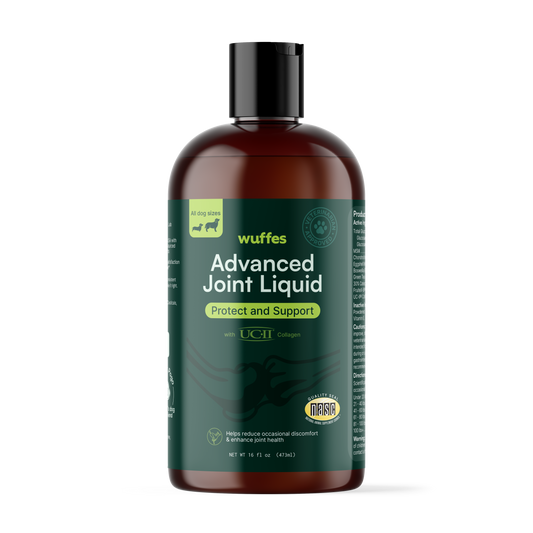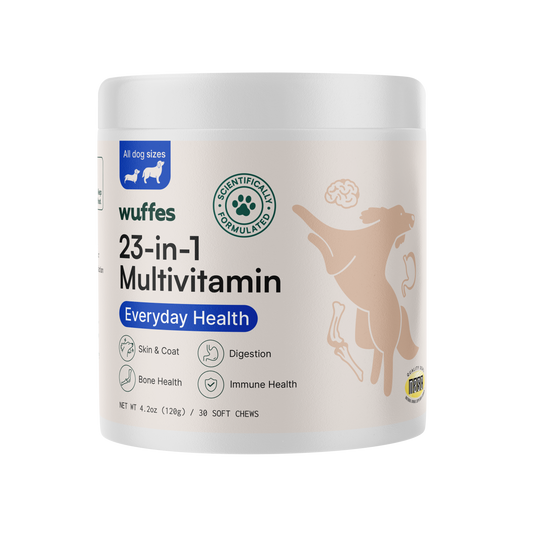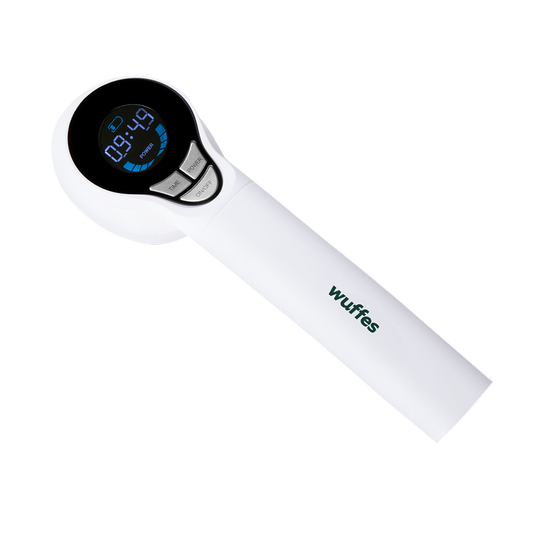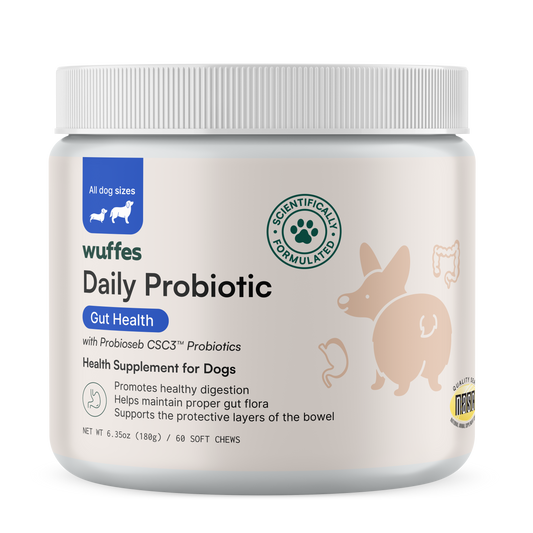While omega-3 fatty acids (omega-3s) are only considered an essential part of the diet for puppies, adult dogs can also benefit from omega-3 supplementation in many ways!
What are Omega-3 fatty acids?
Omega-3s offer a healthy type of fat to the body which supports the body’s production of anti-inflammatory mediators, reducing inflammation body-wide. Additionally, omega-3s can support the body in reducing concentrations of fat in the blood and aid in cellular functions.[1][2]
Importantly, not all omega-3s provide the same benefits. Omega-3s from plant sources, such as flaxseed or canola oil, provide the body with alpha-linolenic acid (ALA), which in dogs and cats, cannot be converted in meaningful amounts to the more useful eicosapentaenoic acid (EPA) and docosahexaenoic acid (DHA).[1][2] EPA and DHA are only found in omega-3s from marine sources, such as fish oil, krill oil, and green-lipped mussels. EPA and DHA are the types of omega-3s that provide numerous health benefits.
Some diets for adult dogs contain omega-3s, but these may be from plant or marine sources. The EPA and DHA included in adult dog diets may not be in high enough amounts to maximally benefit your dog. Therefore, supplementing a marine-sourced omega-3 on top of your dog’s normal food may provide added benefits.[1]
What are the benefits of Omega-3s for dogs?
Marine-sourced omega-3s (EPA and DHA), offer many health benefits to dogs, some of the most-evidenced benefits are listed below:
Supports Brain and Eye Development and Function
EPA and DHA are essential nutrients for puppies due to their important contribution to brain and eye development. In adult dogs, omega-3s can support brain and eye function, including dogs with seizures and/or dry eyes.[3] In older dogs showing signs like dementia in people, omega-3s can also support maintenance of brain function and help reduce signs of anxiety.[1]
Promotes Healthy Joints and Mobility
EPA and DHA are especially powerful in their support of healthy joints, making them very beneficial for dogs with joint issues, such as osteoarthritis.[3] Due to omega-3s support for reducing inflammation within the body, supplementation can especially benefit dogs with inflammation within their joints due to arthritis, or following joint injury or surgery.[1][3][4] Omega-3's help the body reduce joint inflammation and associated pain, allowing your dog to be more comfortable and mobile, while supporting healthier joints.
Enhances Skin and Coat Health
Due in part to anti-inflammatory support, as well as promoting normal functioning of the immune system, and overall skin health, omega-3s can benefit dogs with underlying skin conditions, including allergies and skin infections. Omega-3s also promote healthy, moist skin and coat in dogs without underlying skin conditions.[3]
Supports Normal Immune Function
Omega-3s can support normal functioning of the immune system, playing roles in conditions such as skin allergies, dry eye, and potentially inflammatory bowel disease and cancer.[1][2][3]
Supports Dogs with Some Cancers
Omegas-3s can support dogs with some types of cancer, by supporting the body’s processes to slow cancer progression, enhancing chemotherapeutic drug effects, and supporting the body’s reduction of inflammation and muscle loss associated with cancer.[3]
Are there any side effects of Omega-3s?
When given at recommended doses, omega-3s are very safe for dogs. The common side effects are dose-dependent and preventable, including gastrointestinal upset (nausea, burping, diarrhea, reduced appetite), weight gain due to added calories, and oxidative stress to cells if the diet doesn’t contain adequate vitamin E levels.[2] It is important to talk to your veterinarian regarding the recommended dose for your dog. Your veterinarian will consider the calories added by fish oil to prevent weight gain and assess if a vitamin E supplement should be considered. Your veterinarian will also consider if your dog has any underlying platelet functional abnormalities and ensure the omega-3s that you supplement do not contain a high level of heavy metals.[2] If the recommended dose of omega-3s for your dog is high, you can start by offering a lower dose and gradually increase, to prevent gastrointestinal upset.
Dr. Erin Miscioscia DVM, DACVSMR, CVA



